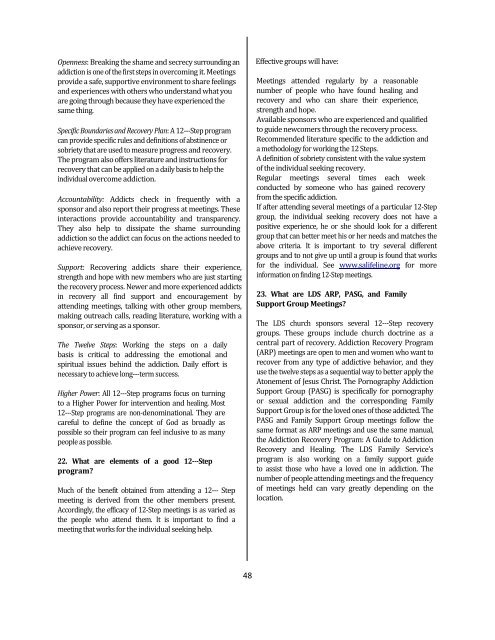Safety Net
Safety Net
Safety Net
You also want an ePaper? Increase the reach of your titles
YUMPU automatically turns print PDFs into web optimized ePapers that Google loves.
Openness: Breaking the shame and secrecy surrounding an<br />
addiction is one of the first steps in overcoming it. Meetings<br />
provide a safe, supportive environment to share feelings<br />
and experiences with others who understand what you<br />
are going through because they have experienced the<br />
same thing.<br />
Specific Boundaries and Recovery Plan: A 12-Step program<br />
can provide specific rules and definitions of abstinence or<br />
sobriety that are used to measure progress and recovery.<br />
The program also offers literature and instructions for<br />
recovery that can be applied on a daily basis to help the<br />
individual overcome addiction.<br />
Accountability: Addicts check in frequently with a<br />
sponsor and also report their progress at meetings. These<br />
interactions provide accountability and transparency.<br />
They also help to dissipate the shame surrounding<br />
addiction so the addict can focus on the actions needed to<br />
achieve recovery.<br />
Support: Recovering addicts share their experience,<br />
strength and hope with new members who are just starting<br />
the recovery process. Newer and more experienced addicts<br />
in recovery all find support and encouragement by<br />
attending meetings, talking with other group members,<br />
making outreach calls, reading literature, working with a<br />
sponsor, or serving as a sponsor.<br />
The Twelve Steps: Working the steps on a daily<br />
basis is critical to addressing the emotional and<br />
spiritual issues behind the addiction. Daily effort is<br />
necessary to achieve long-term success.<br />
Higher Power: All 12-Step programs focus on turning<br />
to a Higher Power for intervention and healing. Most<br />
12-Step programs are non-denominational. They are<br />
careful to define the concept of God as broadly as<br />
possible so their program can feel inclusive to as many<br />
people as possible.<br />
22. What are elements of a good 12-Step<br />
program?<br />
Much of the benefit obtained from attending a 12- Step<br />
meeting is derived from the other members present.<br />
Accordingly, the efficacy of 12-Step meetings is as varied as<br />
the people who attend them. It is important to find a<br />
meeting that works for the individual seeking help.<br />
48<br />
Effective groups will have:<br />
Meetings attended regularly by a reasonable<br />
number of people who have found healing and<br />
recovery and who can share their experience,<br />
strength and hope.<br />
Available sponsors who are experienced and qualified<br />
to guide newcomers through the recovery process.<br />
Recommended literature specific to the addiction and<br />
a methodology for working the 12 Steps.<br />
A definition of sobriety consistent with the value system<br />
of the individual seeking recovery.<br />
Regular meetings several times each week<br />
conducted by someone who has gained recovery<br />
from the specific addiction.<br />
If after attending several meetings of a particular 12-Step<br />
group, the individual seeking recovery does not have a<br />
positive experience, he or she should look for a different<br />
group that can better meet his or her needs and matches the<br />
above criteria. It is important to try several different<br />
groups and to not give up until a group is found that works<br />
for the individual. See www.salifeline.org for more<br />
information on finding 12-Step meetings.<br />
23. What are LDS ARP, PASG, and Family<br />
Support Group Meetings?<br />
The LDS church sponsors several 12-Step recovery<br />
groups. These groups include church doctrine as a<br />
central part of recovery. Addiction Recovery Program<br />
(ARP) meetings are open to men and women who want to<br />
recover from any type of addictive behavior, and they<br />
use the twelve steps as a sequential way to better apply the<br />
Atonement of Jesus Christ. The Pornography Addiction<br />
Support Group (PASG) is specifically for pornography<br />
or sexual addiction and the corresponding Family<br />
Support Group is for the loved ones of those addicted. The<br />
PASG and Family Support Group meetings follow the<br />
same format as ARP meetings and use the same manual,<br />
the Addiction Recovery Program: A Guide to Addiction<br />
Recovery and Healing. The LDS Family Service’s<br />
program is also working on a family support guide<br />
to assist those who have a loved one in addiction. The<br />
number of people attending meetings and the frequency<br />
of meetings held can vary greatly depending on the<br />
location.


